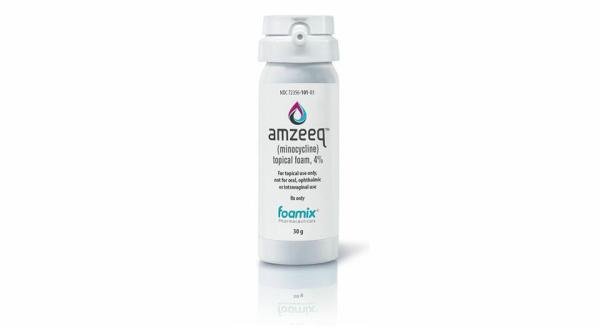Minocycline (mucous membrane powder)
Generic name: minocycline (mucous membrane powder) [ mye-no-SYE-kleen ]
Brand name: Arestin
Dosage form: mucous membrane insert (1 mg)
Drug class: Mouth and throat products
What is minocycline?
Minocycline is a tetracycline antibiotic that fights bacteria.
Minocycline mucous membrane powder is used together with certain dental procedures to treat periodontitis (gum disease). Periodontitis is an infection that causes inflammation in the gums around your teeth. This can cause the gums to pull away from the teeth, leaving deep pockets. Gum shrinkage can lead to tooth loss.
Minocycline powder may also be used for purposes not listed in this medication guide.
Minocycline side effects
Get emergency medical help if you have signs of an allergic reaction: hives, itching, severe rash; swollen glands, unusual tiredness, fever, nausea, stomach pain; lower back pain, painful urination, blood or pus in your urine; chest pain, cough with mucus, difficult breathing; jaundice (yellowing of the skin or eyes); swelling of your face, lips, tongue, or throat.
Some of these signs of allergic reaction have occurred when minocycline was taken by mouth in a pill form. It is not known whether Arestin minocycline powder would cause these same effects when used in dentistry.
Call your dentist at once if you have:
-
pain or swelling in your gums;
-
fever, swollen glands, rash or itching, joint pain or swelling, muscle aches, general ill feeling; or
-
severe skin reaction--fever, sore throat, swelling in your face or tongue, burning in your eyes, skin pain followed by a red or purple skin rash that spreads (especially in the face or upper body) and causes blistering and peeling.
Common side effects of minocycline may include:
-
increased tooth sensitivity;
-
pain;
-
infection; or
-
flu-like symptoms.
This is not a complete list of side effects and others may occur. Call your doctor for medical advice about side effects. You may report side effects to FDA at 1-800-FDA-1088.
Related/similar drugs
Warnings
You should not be treated with minocycline if you are allergic to minocycline or to similar antibiotics such as demeclocycline, doxycycline, or tetracycline.
Before taking this medicine
You should not be treated with this medicine if you are allergic to minocycline or to similar antibiotics such as demeclocycline, doxycycline, or tetracycline.
To make sure minocycline is safe for you, tell your dentist if you have:
-
weak immune system (caused by HIV or other disease);
-
sores or white patches in your mouth or throat (thrush or oral yeast infection); or
-
a condition for which you use treatments that can cause mouth sores (chemotherapy or radiation, steroids, antibiotics, or immunosuppressants).
You should not be treated with this medicine if you are pregnant. Using minocycline during pregnancy could cause permanent tooth discoloration in the baby later in life. Tell your dentist right away if you become pregnant after being treated with this medicine.
Minocycline passes into breast milk and may affect bone and tooth development in a nursing baby. You should not breast-feed after you are treated with this medicine.
How is minocycline given?
You will receive minocycline in a dentist's office.
Minocycline powder is applied directly into the pockets between your gums and teeth. Your dentist will use a special device to place the medicine into these pockets.
For at least 1 week after treatment: You should not chew hard or crunchy foods such as carrots, or sticky foods such as hard candy, taffy, or gum.
For at least 10 days after treatment: You should not use dental floss or a dental pick.
Minocycline powder is only part of a complete treatment program that also includes good oral hygiene and routine dental care.
You may need to receive up to 3 treatments spaced 3 months apart. Follow your dentist's instructions very closely.
Replace your toothbrush with a new one every 3 or 4 months.
Minocycline dosing information
Usual Adult Dose for Periodontitis:
Adult periodontitis:
1 mg applied subgingivally by an oral health care professional into the base of the affected periodontal pocket. The quantity of 1 mg unit dose packets required for treatment varies with the depth, severity, and number of lesions. During clinical trials, up to 121 unit dose containers of minocycline topical were applied to a single patient during a single treatment session. Additionally, patients were treated in up to 3 sessions occurring at 3 month intervals.
What happens if I miss a dose?
Call your dentist for instructions if you miss an appointment for a repeat treatment.
What happens if I overdose?
Since minocycline is given by a dentist in a medical setting, an overdose is unlikely to occur.
What should I avoid after receiving minocycline?
Avoid exposure to sunlight or tanning beds. Minocycline can make you sunburn more easily. Wear protective clothing and use sunscreen (SPF 30 or higher) when you are outdoors.
Avoid smoking, or consider quitting altogether. Smoking can increase your risk of further gum disease and tooth decay.
What other drugs will affect minocycline?
It is not likely that other drugs you take orally or inject will have an effect on minocycline applied to your gums and teeth. But many drugs can interact with each other. Tell each of your health care providers about all medicines you use, including prescription and over-the-counter medicines, vitamins, and herbal products.
More about minocycline topical
- Check interactions
- Compare alternatives
- Reviews (2)
- Side effects
- Dosage information
- During pregnancy
- Drug class: mouth and throat products
- Breastfeeding
Patient resources
Other brands
Arestin, Amzeeq, Zilxi, Cleeravue-M
Professional resources
Other brands
Related treatment guides
Further information
- Your dentist can provide more information about minocycline mucous membrane powder.
Remember, keep this and all other medicines out of the reach of children, never share your medicines with others, and use this medication only for the indication prescribed.
Always consult your healthcare provider to ensure the information displayed on this page applies to your personal circumstances.
Copyright 1996-2025 Cerner Multum, Inc. Version: 2.01.

